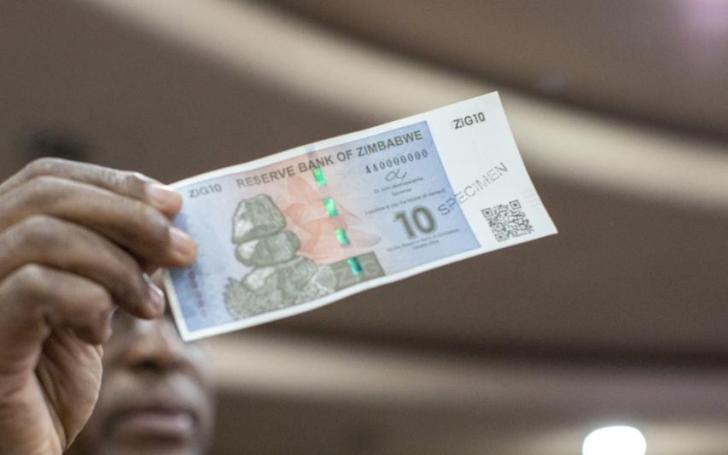News / National
Zimbabwean currency poised to strengthen further
16 Jun 2024 at 08:04hrs |
0 Views

The Zimbabwean currency, Zimbabwe Gold (ZiG), is expected to strengthen against major currencies in the official market due to increased demand as companies prepare to meet their quarterly corporate income tax obligations. By law, companies in Zimbabwe must pay taxes quarterly, with deadlines on March 25, June 25, September 25, and December 20. A recent government directive requires companies to pay half of their tax obligations in ZiG and the remainder in US dollars.
The Reserve Bank of Zimbabwe (RBZ) has reported that the Zimbabwe Revenue Authority collects around US$300 million in corporate income tax each quarter. This means there will be a demand for ZiG equivalent to US$150 million (about ZiG2 billion). Currently, only around US$80 million (nearly ZiG1 billion) worth of ZiG is circulating in the official market following the currency's introduction in April, replacing the Zimbabwe dollar.
This disparity between the available ZiG and the required amount is anticipated to drive up demand for the local currency, potentially strengthening its value in the market. Some companies, especially those dealing predominantly in US dollars, have already started seeking ZiG to meet their June 25 tax obligations.
RBZ Governor Dr. John Mushayavanhu stated that while there is enough reserve money to support economic transactions, the current levels would be inadequate if all companies paid their taxes simultaneously on June 25. However, companies typically start making payments two weeks before the due date, and these funds will be reinjected into the economy through government expenditures, such as civil servant salaries, alleviating some pressure on ZiG demand.
Dr. Mushayavanhu emphasized that the RBZ will monitor the situation to ensure smooth national payments and settlements. Companies might need to convert their US dollar holdings to ZiG at rates set by ZiG holders, and he advised them to start accumulating ZiG now to avoid higher exchange rates later. He assured that the RBZ would maintain the exchange rate within desired stability bands to prevent excessive appreciation, which could have deflationary effects, and depreciation, which could trigger inflation.
The current official exchange rate stands at US$1:ZiG13,48.
The increase in demand for ZiG is expected to strengthen its value, which is beneficial for economic stability. Economist Dr. Prosper Chitambara highlighted that maintaining a strong ZiG is crucial for macroeconomic stability.
ZiG, introduced in April to replace the Zimbabwe dollar, is backed by a basket of precious minerals, primarily gold, and foreign currency reserves held by the central bank.
The Reserve Bank of Zimbabwe (RBZ) has reported that the Zimbabwe Revenue Authority collects around US$300 million in corporate income tax each quarter. This means there will be a demand for ZiG equivalent to US$150 million (about ZiG2 billion). Currently, only around US$80 million (nearly ZiG1 billion) worth of ZiG is circulating in the official market following the currency's introduction in April, replacing the Zimbabwe dollar.
This disparity between the available ZiG and the required amount is anticipated to drive up demand for the local currency, potentially strengthening its value in the market. Some companies, especially those dealing predominantly in US dollars, have already started seeking ZiG to meet their June 25 tax obligations.
RBZ Governor Dr. John Mushayavanhu stated that while there is enough reserve money to support economic transactions, the current levels would be inadequate if all companies paid their taxes simultaneously on June 25. However, companies typically start making payments two weeks before the due date, and these funds will be reinjected into the economy through government expenditures, such as civil servant salaries, alleviating some pressure on ZiG demand.
Dr. Mushayavanhu emphasized that the RBZ will monitor the situation to ensure smooth national payments and settlements. Companies might need to convert their US dollar holdings to ZiG at rates set by ZiG holders, and he advised them to start accumulating ZiG now to avoid higher exchange rates later. He assured that the RBZ would maintain the exchange rate within desired stability bands to prevent excessive appreciation, which could have deflationary effects, and depreciation, which could trigger inflation.
The current official exchange rate stands at US$1:ZiG13,48.
The increase in demand for ZiG is expected to strengthen its value, which is beneficial for economic stability. Economist Dr. Prosper Chitambara highlighted that maintaining a strong ZiG is crucial for macroeconomic stability.
ZiG, introduced in April to replace the Zimbabwe dollar, is backed by a basket of precious minerals, primarily gold, and foreign currency reserves held by the central bank.
Source - The Sunday Mail
Join the discussion
Loading comments…


























